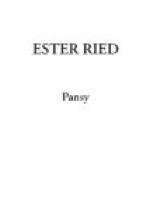in it?” He turned back a step or two, and stooped
for the little white speck. One corner of it was
nestled under a stone. It was a ragged, rumpled,
muddy fragment of a letter, or an essay, which rain
and wind and water had done their best to annihilate,
and finally, seeming to become weary of their plaything,
had tossed it contemptuously on the shore, and a pitying
stone had rolled down and covered and preserved a tiny
corner. Dr. Douglass eyed it curiously, trying
to decipher the mud-stained lines, and being in a
dreamy mood wondered meanwhile what young, fair hand
had penned the words, and what of joy or sadness filled
them. Scarcely a word was readable, at least
nothing that would gratify his curiosity, until he
turned the bit of leaf, and the first line, which
the stone had hidden, shone out distinctly: “Sometimes
I can not help asking myself why I was made—.”
Here the corner was torn off, and whether that was
the end of the original sentence or not, it was the
end to him. God sometimes uses very simple means
with which to confound the wisdom of this world.
Such a sudden and extraordinary revulsion of feeling
as swept over Dr. Douglass he had never dreamed of
before. He did not stop to question the strangeness
of his state of mind, nor why that bit of soiled,
torn paper should possess so fearful a power over
him. He did not even realize at the moment that
it was connected with this bewilderment, he only knew
that the foundation upon which he had been building
for years seemed suddenly to have been torn from under
him by invisible hands, and left his feet sinking
slowly down on nothing; and his inmost soul took suddenly
up that solemn question with which he had never before
troubled his logical brain: “I can not
help asking myself why I was made?” There was
only one other readable word on that paper, turn it
whichever way he would, and that word was “God;”
and he started and shivered when his eye met this,
as if some awful voice had spoken it to his ear.
“What unaccountable witchcraft has taken possession
of me?” he muttered, at length. And turning
suddenly he sat himself down on an old decaying log
by the river side, and gave himself up to real, honest,
solemn thought.
“Where is Dr. Douglass?” queried Julia,
appearing at the dining-room door just at tea time.
“There is a boy at the door says they want him
at Judge Beldon’s this very instant.”
“He’s nowhere” answered Sadie
solemnly, pausing in the work of arranging cups and
saucers. “It’s my private opinion
that he has been and gone and hung himself. He
passed the window about one o’clock, looking
precisely as I should suppose a man would who was about
to commit that interesting act, since which time I’ve
answered the bell seventeen times to give the same
melancholy story of his whereabouts.”
“My!” exclaimed the literal Julia, hurrying
back to the boy at the door. She comprehended
her sister sufficiently to have no faith in the hanging
statement, but honestly believed in the seventeen sick
people who were waiting for the doctor.




